DPC
Conference Report: Curating Research: e-Merging New Roles and Responsibilities in the European Landscape
17 April 2009, The Hague, Koninklijke Bibliotheek, The Netherlands
1. Summary of issues relevant for DPC members
- Training is popular but what sort of training will be most effective: what will drive down costs and support our work best?
- Considerations of scale: what is the right size solution to our digital preservation challenges? Do we want lots of small DP facilities or a small number of large ones?
- How do we collaborate without undermining institutions?
- There would appear to be a lot of policy development which is an important change from a decade ago: but how do we assess the value of these emerging policies and how do we know if they are being applied?
- There is still a policy gap. There are some high level aspirations in the UNESCO Charter and some very detailed guides, but a gap in between. What would be our
- golden rules for creating digital data?
Tackling the Preservation Challenge: Practical Steps for Repository Managers
DPC/RSP/DCC/JISC Workshop![]()
![]()
![]()
![]()
A podcast from this event is available to download from:
http://www.rsp.ac.uk/podcasts/preservation.php
Speakers at the event tell us about practical tools and services to help repositories. Featuring contributions by Frances Boyle, Neil Beagrie, Barbara Sierman, Chris Awre, David Tarrant, Chris Yates, Rory McLeod, Adrian Brown, Kevin Ashley and Matthew Woollard.
We all know that preservation of repository content is vital -- but we also know that in practical terms it remains largely unresolved. What should we be doing right now to embed preservation into the working practice of repositories? Who should we be talking to?
Are there tools and services out there which can support repository managers in their work today? Are preservation experts and services tuned into the practical workflow requirements of their repository manager colleagues? If this has any resonance then this event is for you!
The Digital Preservation Coalition (DPC), the Repositories Support Project (RSP), the Digital Curation Centre (DCC) and the JISC are organising a joint workshop on the 12th December at the Novotel Hotel, Euston, London. The intention is to bring together key stakeholders, the repository managers and preservation experts, at a practical focussed event to talk together and share perspectives, requirements, problems and solutions. It is hoped that the workshop will lead to collective recommendations for what the next moves for repository managers and preservation specialists should be to provide practical focussed support, services and tools. The workshop should in addition further repository managers’ understanding of how to implement preservation strategies and processes.
As well as the formal presentations there will also be a marketplace when there will be an opportunity to view posters, and engage with project teams and see demonstrations of the latest tools. The day will close with a participative discussion session.
Prior to the event the organisers shall gather concerns and requirements from repository managers and preservation experts/services and synthesise these into 'Top 5 Concerns', 'Top 5 Wishes' and 'Top 5 Solutions' (for practical implementation). These will then be collated to form the basis for the panel discussion.
Who should attend?
Repository managers, librarians, archivists, digital preservation experts, information management specialists, service providers.
Benefits of attendance
- An opportunity to share your preservations issues, (concerns, wishes, solutions) with peers and experts.
- To gain insight from repository managers on how they are approaching preservation on different platforms.
- To get up to speed with the outcomes from the extant services and projects working in this important area.
- To gain some tips from fellow practitioners on what works for them.
- To share your digital preservation expertise with the repository community
REGISTRATION NOW CLOSED
Programme
|
Chair: Dr. Les Carr, Director of EPrint Services, University of Southampton |
|
|
09:30 ‑ 09:55 |
Registration and Coffee |
|
09:55 - 10.00 |
Welcome and Introduction |
|
10:00 - 10:30 |
Keynote Presentation – The Importance of Digital Preservation [PDF 81KB] |
|
10:30 ‑ 11:00 |
Digital Preservation at the National Library of Netherlands (KB). Experiences from the Driver Project and E-Depot [PDF 406KB] |
|
11:00 - 11.15 |
Break and Coffee |
|
11.15 - 12.00 |
Market Place Projects and Demonstrations:
|
|
12:00 - 13:00 |
Case Studies: Fedora [PDF 942KB] |
|
13:00 - 14:00 |
Lunch |
|
14:00 - 14:20 |
LIFE2 [PDF 1.0MB] |
|
14:20 - 15:05 |
Service Providers: ULCC [PDF 1.6MB] |
|
15:05 - 15:20 |
Break and Coffee |
|
15:20 - 16:05 |
Panel Discussion led by Les Carr |
|
16:05 - 16:10 |
Closing Remarks |
Digital Preservation Planning: Principles, Examples and the Future with Planets
![]()

PLANETS and the Digital Preservation Coalition (DPC) will be holding a joint briefing day: Digital Preservation Planning: Principles, Examples and the Future with Planets, on the 29th of July 2008, at the British Library Conference Centre, St Pancras, London.
The event will be an informal and interactive workshop allowing attendees to share knowledge and experience in digital preservation planning, setting strategy and policy plus first-hand experience of Planets tools and technology.
Attendees will also hear from DPC members about the approaches they have used in their organisations and the outcomes. There will be plenty of opportunity to ask questions and for discussion.
Planning is crucial to the process of preserving digital information and data. Planets has taken preservation planning as its research focus. From mid 2010, Planets will deliver downloadable software to help organisations plan and execute preservation activities.
Benefits of attendance
- Understanding of aspects of preservation planning, policy and strategy setting
- Real-life insight into other organisations’ approaches to preservation planning
- Awareness of the range of services and tools Planets will deliver
- Hands-on experience of Plato, Planets’ preservation planning tool
- Insight into identifying the characteristics of digital objects
- Understanding of working in a testbed environment
- An opportunity to ask questions and for discussion
Who should attend?
The event will appeal to anyone involved at any stage in digital preservation policy, strategy and planning cycle. (e.g. librarians archivists, digital librarians and archivists, repository mangers, software developers, vendors, policy managers etc and others working in a wide range of settings).
Programme
|
Time |
||
|
9.00 |
Registration and coffee |
|
|
Morning Session Chair – Frances Boyle, DPC |
||
|
09.30 |
What's it all about? Scene Setting & Overview for the Day (PDF 406KB) |
Frances Boyle, DPC |
|
10.15 |
Andreas Rauber, Vienna University of Technology |
|
|
10.45 |
Constructing a Preservation Policy: the case of the UK Data Archive (PDF 378KB) |
Matthew Woollard, UKDA |
|
11.15 |
Break and Coffee |
|
|
11.30 |
Natalie Walters, Wellcome Library |
|
|
12.00 |
Preservation Planning (Part 1): Workflow and the Plato tool (PDF 2.2MB) |
Christoph Becker, Vienna University of Technology |
|
12:30 |
Lunch |
|
|
Afternoon Session Chair – Frances Boyle, DPC |
||
|
13:00 |
Preservation Planning (Part 2): Simulation and practical exercises |
Christoph Becker & Andreas Rauber, Vienna University of Technology |
|
14.10 |
Christoph Becker |
|
|
14.30 |
Manfred Thaller, University of Cologne |
|
|
15.00 |
Break and Coffee |
|
|
15.15 |
Matthew Barr, HATII, University of Glasgow |
|
|
16.15 |
Interactive discussion session |
Prof. Kevin Schürer, UKDA |
|
17.15 |
End |
|
Key to acronyms:
| PLANETS | Preservation and Long-term Access through NETworked Services |
| UKDA | UK Data Archive |
| HATII | Humanities advanced Technology and Information Institute, University of Glasgow |
Mind the Gap: Assessing Digital Preservation Needs in the UK
June 2008
The Review Board for the ITT 'Mind the Gap' - follow up study reviewed responses to the ITT in mid-June. Whilst the Review Board found much to commend in the proposals it was decided not to award a contract at this time. The brief will be re-scoped to focus on actions for which the DPC or its members can take responsibility for and it will have a strong practical and achievable focus.
The 'Mind the Gap' report was published with 21 recommendations aimed at a range of stakeholders. To gauge which of these are the most important to the DPC community, members were asked to participate in a survey to consider the final 'Mind the Gap' recommendations. They voted on which recommendations would impact on their work and deliver the greatest benefit to the digital preservation community if achieved successfully.
Mind the Gap
Added on 1 June 2008
Report reveals major gaps in long term management of valuable digital assets
15th February 2006
A 'state of the nation' report today reveals that less than 20% of UK organisations surveyed have a strategy in place to deal with the risk of loss or degradation to their digital resources - despite a very high level of awareness of the risks and potential economic penalties.
With the release today of the report, Mind the gap: assessing digital preservation needs in the UK, the Digital Preservation Coalition (DPC) aims to help government, public institutions and private companies turn high awareness into concerted action.
ICPSR become DPC Ally
Added on 30 April 2008
The Inter-University Consortium for Political and Social Research (ICPSR)
It gives me great pleasure to announce that The Inter-University Consortium for Political and Social Research (ICPSR) has become an allied organisation of the Digital Preservation Coalition (DPC).
The ICPSR (http://www.icpsr.umich.edu/ICPSR/) is, like the DPC a membership organisation. It encourages and facilitates research and instruction in the social sciences and related areas by acquiring, developing, archiving, and disseminating data and documentation relevant to a wide spectrum of disciplines, and by conducting related instructional programs.
Chris Rusbridge, a Digital Preservation Coalition Board Director, said:
What to preserve? Significant Properties of Digital Objects
![]()

Significant properties are essential characteristics of a digital object which must be preserved over time for the digital object to remain accessible and meaningful. Proper understanding of the significant properties of digital objects is critical to establish best practices and helps answer the fundamental question related to digital preservation: what to preserve?
The importance of significant properties has been highlighted by a number of notable digital preservation initiatives in recent years. These include a range of projects funded by the Joint Information Systems Committee (JISC) and the European Union, in which work has been undertaken to investigate the factors affecting decisions on significant properties, to establish generic models for determining them, to develop tools and services for describing and extracting them, or simply to understand complex digital object types, using the concept of significant properties as a starting point.
JISC, the British Library and the Digital Preservation Coalition (DPC) are organising a joint workshop on 7th April at the British Library Conference Centre. The intention is to bring together the relevant projects and report on progress to date.
To open PDFs you will need Adobe Reader Neil Grindley (JISC) Welcome and introduction |
 Keynote Speaker Andrew Wilson (NAA) Presentation PDF 199KB |
 Stephen Grace (CeRch) INSPECT Project Presentation PDF 1.3MB |
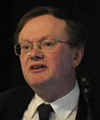 David Duce (OBU) JISC Study 1 - Vector Images Presentation PDF 1.6MB |
 Mike Stapleton, (SSL) JISC Study 2 - Moving Images Presentation PDF 561KB |
 Brian Matthews (STFC) JISC Study 3 - Software Presentation PDF 1.1MB |
 Richard Davis (ULCC) JISC Study 4 - e-Learning Objects Presentation PDF 1.0MB |
 Adrian Brown (PLANETS) Preservation Characterisation in PLANETS Presentation PDF 1.5MB |
 Roger Lloyd (Barclay Wealth) Industry / Media Presentation PDF 839KB |
 Colin Neilson (DCC) SCARP Project Presentation PDF 719KB |
 Stephen Rankin (on behalf of David Giaretta) (DCC) Digital Object Semantics Presentation PDF 453KB |
 Cal Lee (UNC Chapel Hill) SIGPROPS Presentation PDF 193KB |
 Andrew Wilson (NAA) Comments/summary |
 Chair, Chris Rusbridge (DCC) Discussion |
 Frances Boyle (DPC) Closing Remarks |
Key to acronyms:
| JISC | Joint Information Systems Committee |
| NAA | National Archives of Australia |
| CeRch | Centre for e-Research , King's College London (incorporating the Arts & Humanities Data Service) |
| OBU | Oxford Brookes University |
| SSL | System Simulation Ltd. |
| STFC | Science and Technologies Facilities Council |
| ULCC | University of London Computing Centre |
| PLANETS | Preservation and Long Term Access Through Networked Services |
| TBC | To be confirmed |
| DCC | Digital Curation Centre |
| UNC | University of North Carolina |
| DPC | Digital Preservation Coalition |
Photographs

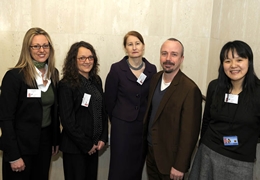
The Organisers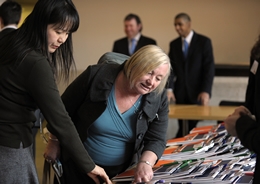
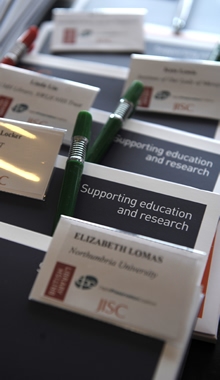
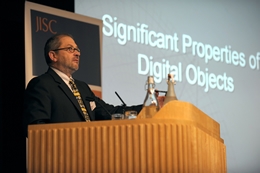
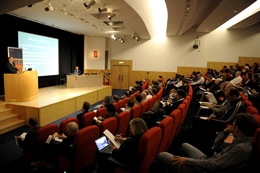
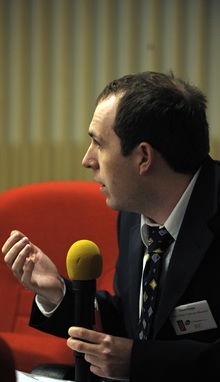

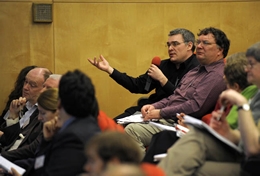


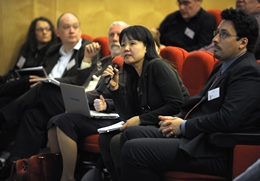
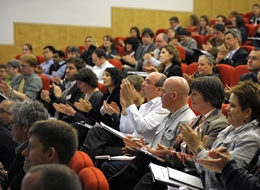
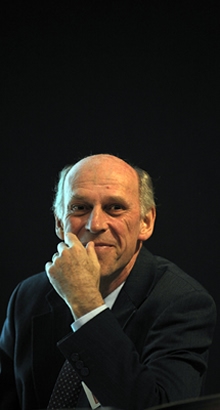
PDF should be used to preserve information for the future
Added on 1 April 2008
Good news the already popular PDF file format adopted by consumers and business alike is one of the most logical formats to preserve today's electronic information for tomorrow.
According to the latest report released today by the Digital Preservation Coalition (DPC), Portable Document Formats (PDF) is one of the best file formats to preserve electronic documents and ensure their survival for the future. This announcement will allow information officers to follow a standardised approach for preserving electronic documents.
Information management and long-term preservation are major issues facing consumers and businesses in the 21st Century. This report is one of a series where The Digital Preservation Coalition (DPC) aims to think about and address the challenges facing us.
JPEG 2000 a great step forward for the archival community
Added on 1 February 2008
The Digital Preservation Coalition has examined JPEG 2000 in a report published today. The report concludes that JPEG 2000 represents a great stride forward for the archival community. The format now allows for greater compression rates and a recompression rate that is visually lossless.
The findings come as the Digital Preservation Coalition launch its latest 'Technology Watch Report' written by Dr. Robert Buckley, a Research Fellow with Xerox, 'JPEG 2000 - a practical digital preservation standard?'. The report looks in-depth at the new format and the challenges it has to cope with. JPEG 2000 is widely used to collect and distribute a variety of images from geospatial, medical imaging, digital cinema, and image repositories to networked images. Interest in JPEG 2000 is now growing in the archival and library sectors, as institutions look for more efficient formats to store the results of major digitisation programmes.
DP Awards 2007 Showcase and Shaping the DPC
Programme
|
09:30 |
Registration |
|
10:00 |
Welcome & Outline of Day - Frances Boyle, DPC Executive Director The 2007 DP Awards Showcase |
|
10:10 |
The Judges Perspective - Kevin Ashley, Chair of the Judges |
|
10:25 |
LIFE - Richard Davies |
|
10.50 |
Web Curator Tool - Philip Beresford |
|
11:15 |
Morning Break |
|
11.30 |
PRONOM and DROID - Adrian Brown |
|
11.55 |
Paradigm - Susan Thomas |
|
12.20 |
Digital Repository Audit and Certification |
|
12.45 |
Summing up |
|
13.00 |
Lunch Shaping the DPC Session |
|
13.45 |
Outline of the Afternoon Session - Frances Boyle |
|
14.00 |
Breakout Groups |
|
15.00 |
Afternoon Break |
|
15.20 |
Speed Reporting |
|
15.45 - 16.15 |
Summing Up and Close - Frances Boyle |
Background
The Digital Preservation Coalition (DPC), now in its sixth year, seeks to be a proactive membership organization fostering joint action to address the urgent challenges of securing the preservation of digital resources in the UK.
At the start of the new chapter in its history, the DPC would like to hear from its members and to provide them with an opportunity to shape its next, hopefully equally successful and productive, phase. So please do attend this event which will go some way to inform DPC activities and priorities.
About the Day
The morning session will comprise of presentations from the five short-listed DP Award projects. This will provide you with an opportunity to learn more about the diverse and fascinating projects that were showcased at the Conservation Awards ceremony in September. We will also hear the Judges' perspective into how they evaluated the projects. You may even pick up some tips for the 2009 DP Awards!
http://www2.digitalpreservationcoalition.co.uk/advocacy/2007-shortlist.html
This session will be chaired by Kevin Ashley, the Chair of the Judging Panel.
After a nutritious lunch and an initial briefing you will break up into groups to focus on your selected topics. We will endeavour to ensure that you are assigned to your preferred group but we cannot always guarantee this and indeed may have to assign you to another group. There will however be an opportunity to contribute views on all issues that will be covered during the day. Full details of your group allocation will be sent to you before the event.
The key recommendations, comments, issues which arise from the discussion will be shared with other participants through a 'speed reporting' session (more about this on the day) followed by the final summing up of all those 'big ideas'.
Breakout Group Themes
The following are the themes which the groups will consider. The bullet points are merely suggestions to kick start the discussions - you may wish to consider other issues within your area - so please do feel free to! Further details will be provided before the event. Please indicate your preferences for the groups, in 1-5 order where (1) is your preferred option.
-
'Top 5' for 2008 - Planning for the Near Future:
- Consider what are the most (5) important issues in the digital landscape over the coming year
- How will these impact on digital preservation?
- What are the threats and opportunities that these issues will bring to digital preservation
- How can the DPC contribute to these discussions?
- How can the DPC take forward these issues on behalf of its members?
- DPC Governance:
- Look at the mission - is this still relevant? If not why not? [A copy of the published goals etc will be provided]
- How would you improve the mission statement?
- Look at the goals, aims and principles. Could these be recast, reshaped?
- If so how, why etc.
- DPC Activities:
- What type of event do you find useful e.g. workshops, conferences?
- What activities would you like the DPC to run that they have not previously done?
- Is the DPC 'Handbook of Digital Preservation' still useful?
- Would you like to see the Handbook updated?
- Would you like to see a follow up to 'The Mind the Gap' report?
- Would you like to see more training programmes offered through the DPC?
- Outreach:
- Website - how could this be improved?
- What information would you like to see on the website?
- Awareness alerting tools. What tools work best for you? For example the 'What's New' list on the website, RSS feeds, mailing lists etc.
- Create some strap/tag lines for the DPC. Why are these meaningful?
- Suggest 5 pragmatic ways how the DPC could continue to serve its members.
- Future Gazing - Making Ready for the Mid Future :
- Picture star date 2017, what will the digital landscape comprise of then for all our constituencies e.g. learners, citizens, researchers, government etc?
- What emerging technologies, trends (social, organizational etc), developments etc will impact on digital preservation?
- How can we ensure that the digital preservation component is kept on the agenda of other allied digital initiatives?
- How can the DPC empower its members to be fit for the 'digital preservation purpose' now and in the future?
Who Should Attend?
Colleagues from member organizations whatever your role and interest is in digital preservation or related digital asset management and stewardship areas. Your views and comments would be most welcome.
Benefits of Attendance
- A chance to learn from exemplars of good practice from the DP Award short-listed projects
- To network and engage with colleagues from other member organizations
- An opportunity to air your views on matters digital preservation
- A chance to dabble in 'digital gazing'
- To contribute to, and take forward the work and aims of the DPC
- Finally to become a shaper of the DPC
Subcategories
Blog
Unless otherwise stated, content is shared under CC-BY-NC Licence































































































































